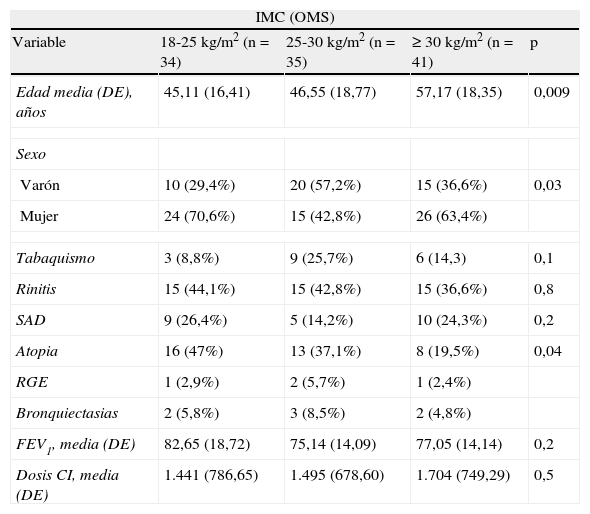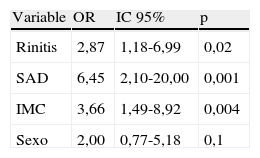Parece existir una conexión epidemiológica entre asma bronquial y obesidad, pero su posible vínculo con el control de la enfermedad es controvertido. El objetivo del presente estudio es conocer si la obesidad se asocia con el control del asma.
Pacientes y métodoSe incluyeron pacientes ambulatorios, diagnosticados de asma bronquial, con buena adherencia terapéutica y técnica inhalatoria correcta. Se evaluó el control mediante el test de control del asma y se relacionó con: edad, sexo, volumen espiratorio forzado en el primer segundo, tabaquismo, índice de masa corporal (IMC), rinitis, trastornos ansioso-depresivos, bronquiectasias, reflujo gastroesofágico y atopia. Para el análisis estadístico se emplearon: ji al cuadrado, t de Student y regresión logística.
ResultadosLa muestra la constituyeron 110 pacientes, de los cuales 41 (37,3%) presentaban un IMC≥30kg/m2. El mal control se asoció en el análisis bivariado con: IMC, rinitis, trastornos ansioso-depresivos y sexo femenino. En el multivariado mantuvieron asociación: IMC (odds ratio [OR] 3,66, intervalo de confianza del 95% [IC 95%] 1,49-8,92), rinitis (OR 2,87, IC 95% 1,18-6,99) y trastorno ansioso-depresivo (OR 6,45, IC 95% 2,10-20).
ConclusiónHemos apreciado una asociación entre obesidad y control del asma, por lo que la reducción ponderal podría tener implicaciones clínicas.
An epidemiological association between obesity and asthma has been confirmed, but its possible link to disease control is controversial. The aim of this study was to investigate if asthma control was related with obesity.
Patients and methodsAsthmatics adult outpatients with good compliance on therapy and correct inhalation technique were included. An Asthma Control Test validated for Spanish population was used to measure asthma control and it was related with: age, sex, forced expiratory volume in one second, smoking, atopy, body mass index (BMI), rhinitis, anxiety and/or depression, bronchiectasis and gastroesophageal reflux. For statistical analysis chi square distribution, Student test and a logistic regression analysis were used.
ResultsOne hundred and ten patients were included, of whom 41 (37.3%) had BMI≥30kg/m2. Poor asthma control was associated, in the bivariate analysis, with: BMI, rhinitis, anxiety-depressive disorders and female sex. In the multivariate analysis, it remained independently associated with: BMI (odds ratio [OR] 3.66, 95% confidence interval [95% CI] 1.49-8.92), rhinitis (OR 2.87, 95% CI 1.18-6.99 and anxiety-depressive disorder (OR 6.45, 95% CI 2.10-20).
ConclusionsWe conclude that there is a link between obesity and poorly controlled asthma, hence weight loss may have major clinical implications.
Artículo
Comprando el artículo el PDF del mismo podrá ser descargado
Precio 19,34 €
Comprar ahora








